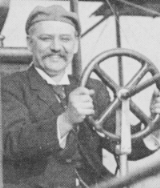
Herman C. Baehr
Encyclopedia
 |
|
| Office: | Mayor, Cleveland, Ohio Cleveland, Ohio Cleveland is a city in the U.S. state of Ohio and is the county seat of Cuyahoga County, the most populous county in the state. The city is located in northeastern Ohio on the southern shore of Lake Erie, approximately west of the Pennsylvania border... |
|---|---|
| Political party: | Republican |
| Term of office: | 1910–1911 |
| Preceded by: | Tom L. Johnson Tom L. Johnson Thomas Loftin Johnson , better known as Tom L. Johnson, was an American politician of the Democratic Party from the late 19th and early 20th centuries. He headed relief efforts after the Johnstown, Pennsylvania floods of 1889, was a U.S. Representative from 1891–1895 and the 35th mayor of... |
| Succeeded by: | Newton D. Baker Newton D. Baker Newton Diehl Baker, Jr. was an American politician who belonged to the Democratic Party. He served as the 37th mayor of Cleveland, Ohio from 1912 to 1915 and as U.S. Secretary of War from 1916 to 1921.-Early years:... |
| Date of birth: | March 16, 1866 |
| Date of death: | February 4, 1942 |
| Profession: | Businessman |
Herman C. Baehr (March 16, 1866 – February 4, 1942) was an American
United States
The United States of America is a federal constitutional republic comprising fifty states and a federal district...
politician
Politician
A politician, political leader, or political figure is an individual who is involved in influencing public policy and decision making...
of the Republican Party who served as the 36th mayor of Cleveland, Ohio
Cleveland, Ohio
Cleveland is a city in the U.S. state of Ohio and is the county seat of Cuyahoga County, the most populous county in the state. The city is located in northeastern Ohio on the southern shore of Lake Erie, approximately west of the Pennsylvania border...
from 1910 to 1911.
Baehr was born in Keokuk, Iowa
Keokuk, Iowa
Keokuk is a city in the southeastern part of the U.S. state of Iowa and one of the county seats of Lee County. The other county seat is Fort Madison. The population was 11,427 at the 2000 census. The city is named after the Sauk Chief Keokuk, who is thought to be buried in Rand Park...
, the son of Jacob and Magdalena Zipf Baehr, both of whom had lived in Cleveland from 1850 to 1862. The family returned to the city after the American Civil War
American Civil War
The American Civil War was a civil war fought in the United States of America. In response to the election of Abraham Lincoln as President of the United States, 11 southern slave states declared their secession from the United States and formed the Confederate States of America ; the other 25...
. Baehr was educated in public schools and left at age 14 to join his father's brewing company. He later left Cleveland to complete his education. He attended Lehman's Scientific Academy, graduated from the First Scientific Station of New York in 1887, and received a Bachelor of Medicine degree. When he returned to Cleveland, Baehr became an official of the Baehr Brewing Co., which his father had founded, and later secretary and treasurer of the Cleveland-Sandusky Brewing Corp., when it took over Baehr Brewing. In 1898, he married Rose Schulte.
Baehr became interested in Republican politics and eventually met Mark Hanna
Mark Hanna
Marcus Alonzo "Mark" Hanna was a United States Senator from Ohio and the friend and political manager of President William McKinley...
. His friendship with Hanna sparked a second career in politics. In 1903, at Hanna's urging Baehr ran for and was elected County Recorder. Hanna died the following year, and local GOP looked to Baehr to run against Tom L. Johnson
Tom L. Johnson
Thomas Loftin Johnson , better known as Tom L. Johnson, was an American politician of the Democratic Party from the late 19th and early 20th centuries. He headed relief efforts after the Johnstown, Pennsylvania floods of 1889, was a U.S. Representative from 1891–1895 and the 35th mayor of...
for the city's mayor.
In 1909, Baehr ran a solid election against Johnson, with support from Millionaire's Row and the recent influx of German immigrants who were drawn to Baehr's German ancestry. He finally defeated Johnson, in what many see as the greatest upset in Cleveland politics. Although he was heavily criticized by the press, Baehr's tenure as mayor was relatively efficient. He restored conservative fiscal policies, oversaw further down town development, and carried through with Johnson's idea of a three-cent fare. In 1912, he stepped down as mayor and instead became the first vice-president and director of the Forest City Savings and Trust Company.

